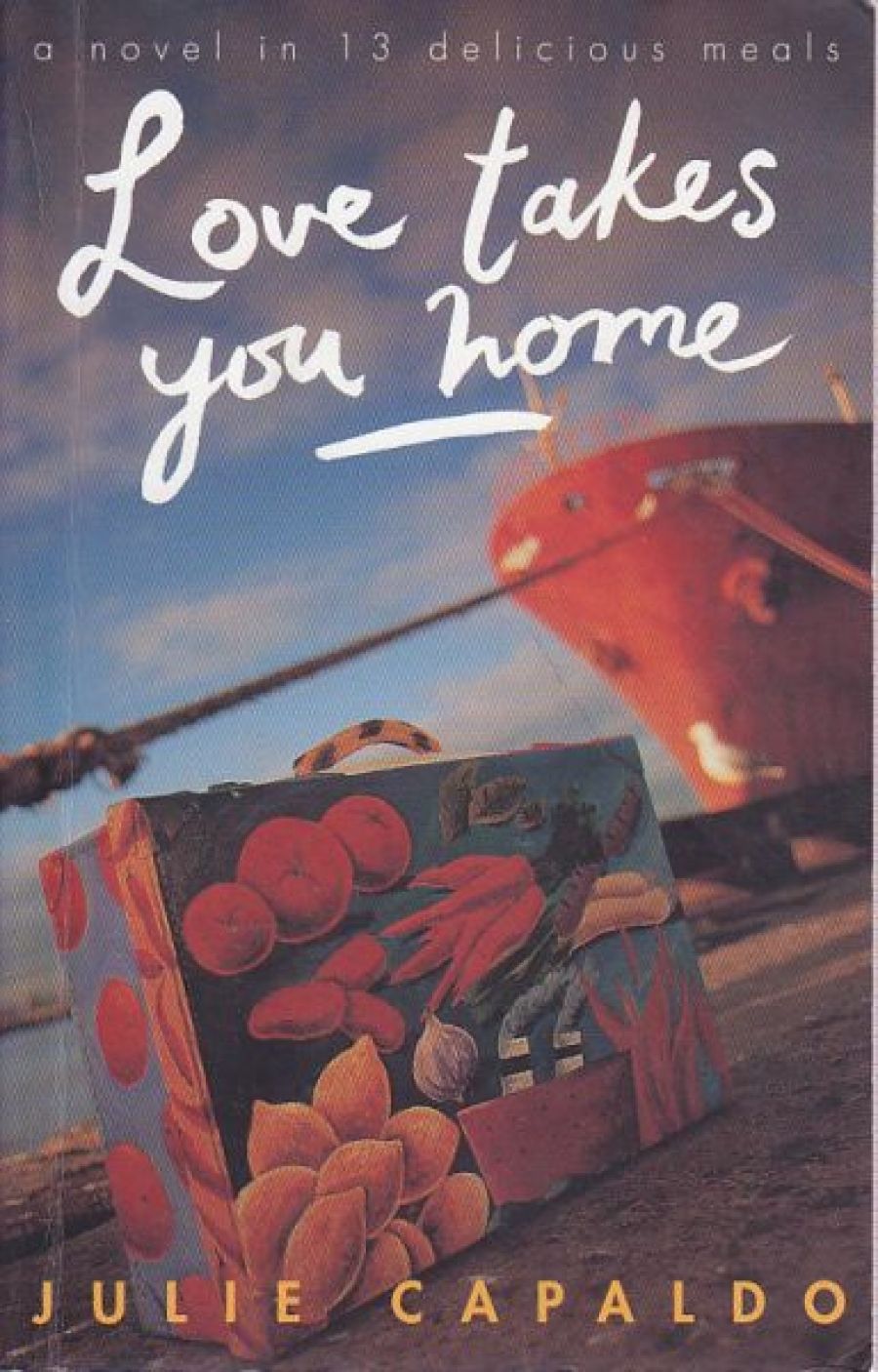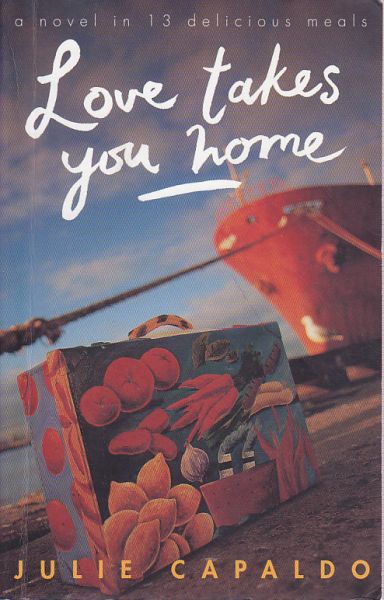
- Free Article: No
- Contents Category: Fiction
- Review Article: Yes
- Article Title: Edges Melt Away
- Online Only: No
- Custom Highlight Text:
Fact or fiction, cookbook or novel, the recipe is a unique discourse, embedded within other discourses, with its own narrative relationships with those discourses. The giving of a recipe is important, as is the sharing or, indeed, the unauthorised acquisition. The author of the recipe is equally important, as is the response elicited by the author for that which is desired. It is a social exchange, above all; some would say one that is exclusively feminine, but not necessarily so for Julie Capaldo in her first novel, Love Takes You Home.
- Book 1 Title: Love Takes You Home
- Book 1 Biblio: Reed Books, $14.95 pb, 240 pp
- Book 1 Cover Small (400 x 600):

- Book 1 Cover (800 x 1200):

Capaldo draws together the stories of her strange extended family; her morose and emotionally lost mother Judy, her kind and spiritually troubled father, and her bile-ridden grandmother Graziella, a family bound together by blood, grudges and cultural ritual. But it is the bonds that she shares with the Portelli family that weave their way into her heart; Zia Valda and Zio Pino, the latter an Italian immigrant to Australia who recreated the senses of his homeland with the alchemy of herbs and spices, and the transformative powers of food prepared by his own hands.
Initially alone in a strange land, he reinscribes landscapes of his new experience with familiar tastes and smells, challenging what he sees as the harsh, grey boundaries of Australian living with the colours and sensations of his cooking. It is his recipe book that becomes a gift of blessing and love to Grace Sabato when she decides to travel away from Australia; it is, his present of leopard-skin stilettos to her that acknowledges Grace’s own transformation towards womanhood. Zio Pino understands the fluidity of life in its seasonal and generational cycles, changes that cannot be possessed and rendered stagnant as Graziella, witch-like, would prefer.
Capaldo blends story into recipe; the smell of baccalà or bread soup into Proustian encapsulations of moments in memory’s time; chapters into meals and meals into rites de passage that serve as an orbit for characters to relate each other’s lives through the sharing of food. And where there is magic and transformation, there is bound to be knowledge misused as much as used, the ominous nudging the mysterious. Graziella knows this and Grace does not really know until the end of the book just how much power her grandmother gleans from even the most simple acts of living:
I felt alive with the no-hopers. I could see the edge of life in their eyes, as sure and real as the early navigators who believed there was an edge to the world and if they sailed to that edge they would fall into darkness and be lost forever. Graziella made me chocolate pudding once ... I watched as she used a fork to beat the brown powder into the steaming water. The powder seemed to resist the water and floated in a dry lump on the surface. She said, ‘Edges dissolve. Sometimes, if you just sit still and let things settle, look behind what you think is real, you will see things differently as the edges melt away.
‘At last a first novel that realises the lush potential of the imagination: Capaldo’s characters are vivid and believable, her writing confident.
Natalie Scott also recognises the metaphorical abundance offered by the employment of food and eating within the text. In her collection of short stories, Eating Out and Other Stories, characters face emotional choices, pain, comfort, and decisions to travel forward in life over a variety of meal tables. There’s Josette and her grandmother sharing a rare and joyous meal together at the Hotel Continental; Dennis, the outsider entranced by the bustle of the inner sanctuary of the University dining areas; the boss’ daughter wooed by a wealthy businessman ordering Escalopes de veau Sophie, because that is her name and because he can afford not to be interested in her money.
Although the table becomes a spatial arena to draw together characters within a situation, Scott uses it as a fluid symbol, more to do with slippage and the breaching of hitherto familiar boundaries. May Booth, in ‘Real Estate’ ,ventures into the cut-throat world of house auctioneering, armed with compassion and a penchant for the gourmet triple sandwiches served at the back of the room. ‘When in Rome’, finds Brenda and her husband dining with their gay son and his friends in a setting that has little in common with the local RSL.
Food becomes a multifaceted device throughout all of Scott’s stories, but it runs a clear second to that which the author does best; the unfolding of characters and their relationships. It is rare to find a collection of short stories where the themes are so pleasantly diverse, the characters so admirably distinct.
At the end of each story recipes are included for dishes mentioned within that story, yet the dissolving of the boundaries of personal experience represented within the fiction is somewhat lost by the clinical listing of ingredients and abrupt instructions on how to proceed. That which is meant to be an integral part of the textual theme detracts from rather than complements Scott’s accomplished prose. The recipes have the air of an afterthought, a trendy contrivance shockingly edited, if at all. They do little justice to the author’s works; fortunately Natalie Scott’s stories invite the reader on, even if the recipes fail to send one rushing to the chopping board.


Comments powered by CComment